This week’s message (Friday 17 June 2022)
Posted on 17 June 2022 by Mr Roundtree
To kick off this week, do check out this exciting event happening in Leeds: Little Amal has travelled over 8,000km and is in Leeds on Monday evening.
This week’s message comes from Mr Wilks, who leads on Science and foundation subjects across Sphere Federation…
What do we mean by topics?
Topics are the vehicle for delivering much of the learning in the foundation subjects (eg history, art, geography…). Each half-termly topic has a driving subject – the main focus for teaching pupils the knowledge and skills they need to succeed in life. The driver changes with each topic to ensure a broad and balanced curriculum.
Although the learning in each topic will be provided by the driving subject, there are opportunities for enrichment through other subjects. For example, learning in an art topic may be enriched by geography – learning about where an artist was born and lived.
Read more about the intent, implementation and impact of our topics.
What is this half-term’s topic?
Design and Technology is the driving subject for this half-term and it’s a great topic to finish the year! The focus for all classes this year is textiles (next year, it’s construction), so your child will be busy designing and making products using fabric.
A key aspect of the Design and Technology curriculum is the understanding that products don’t just get made. Instead, they go through a design process that includes three key elements: evaluate, design and make. Think of this process as a cycle. For example, Sphere Motors want to create a new family car. Before the car is made, they need to evaluate existing products and talk to customers so that they’re clear about what the new car needs to have. They will then design the car and evaluate those designs. They may make a prototype of the car to help them evaluate the designs. Next, they’ll decide on a final design that will go into production and get made. This finished product will be evaluated and the whole process starts again.
Each phase has age-related specific knowledge, skills and vocabulary that they’ll learn, use and apply across the topic. See page 17 and 18 of our Curriculum Statement.
Years 1 and 2
The product the children will be designing, making and evaluating is a hand puppet. They’ll start by learning about the design process before looking at and evaluating existing hand puppet products. They’ll then learn to use an over stitch and practise threading needles and tying knots. Following this, they’ll be introduced to all the materials they can use to create their puppet. Once they’re familiar with the materials, they’ll design their puppet. Next, it’s on to the making stage. They’ve already honed their sewing skills so they should be confident making and then decorating their puppets according to their designs. Finally, it’s evaluation time: children will compare their designs to their finished products. They’ll reflect on successes and things they’d do differently next time.
Years 3 and 4
The product the children will be designing, making and evaluating is a pouch. The function of this pouch is entirely up to them. It could be used to store some pens, trading cards, a shell collection. Children can be as creative as they like – as long as the pouch can be made using a 23cm² piece of felt!
Before they begin to design their pouch, they’ll learn about a famous designer and how they became a designer. They’ll also learn some important skills that a designer needs. Children will then evaluate existing pouches, with a focus on fastenings, and will then design their pouch. They’ll practise their sewing skills, becoming proficient using a running stitch. They’ll then begin to make their pouches. First, they’ll create a template which they’ll use to cut out the pieces. Next, they’ll join the pieces using their running stitch and create a fastening for their pouch. Finally, they’ll evaluate their designs by comparing them to their designs, testing whether they’re fit for purpose and reflecting on their successes and areas to improve.
Years 5 and 6
The product the children will be designing, making and evaluating is a cushion. Before they get stuck into their cushion, they’ll learn about some designers who changed the world: Isambard Kingdom Brunel, George Stephenson, Lewis Latimer and Jony Ive. They’ll learn about their creations and their impact and look for things that link the designers. Following this, children will learn about the importance of design criteria when designing a product. After this, they’ll be practising their sewing skills and learn how to sew using a backstitch. Next, they’ll evaluate existing cushions. They’ll then decide on the specific design criteria for their cushions and create their designs using an annotated sketch, detailing the dimensions of their product. They’ll learn about the importance of using sustainable materials when researching the filling used for their cushion (the plan is to use old, unwanted pieces of fabric to stuff the cushions rather than Polyfill so please have a look through your wardrobe and keep hold of any old t-shirts or other clothes as we’ll need them later in the half-term).
Children will use a template to cut out the shapes, use a backstitch to add decoration to their cushion before finally sewing the pieces together and stuffing them. The final stage is to evaluate the designs against the design criteria.
Help at home
Talk to your child about what they’ve been learning in class. The class news page of the school website is a good place to go to find out more about what the children are doing.
The school library and local libraries will have some books about Design and Technology which your child will be able to borrow and develop both their reading skills and design knowledge.
Finally, there are a lot of programmes on CBBC and CBeebies with a Design and Technology focus:
- Bitz and Bob
- Grace’s Amazing Machines
- Junk Rescue
- Maddie’s Do You Know?
- The Dengineers
This week’s message (Friday 10 June 2022)
Posted on 10 June 2022 by Mr Roundtree
And we’re into the last half-term of the year – we hope you and your family had a good half-term break. This week’s message has just two parts: a reminder to complete the annual survey and some important news about classes and teachers next year.
Annual survey
Every year, we invite you to complete a short survey. Your views matter. They help to shape what we do in the forthcoming year(s).
Complete the Moortown Primary survey here.
(It’s worth bearing in mind that the survey isn’t the best place to raise individual, specific concerns – hopefully, you’re comfortable to speak with Mrs Weekes or a class teacher about these instead.)
Staffing in 2022-23
With Mrs Burke retiring and Miss Wilson on maternity leave, there are a couple of new faces who’ll be joining the Moortown team next year – one of whom you may have seen before! Here are the teachers and classes for next year:
- Y6: Mr Wain, supported by Mr Fayers as a trainee teacher
- Y5: Miss Goswami (a new teacher joining our team from a school in Harrogate)
- Y4: Miss Birch
- Y3: Miss Needham
- Y2: Mrs Taylor and Mrs Lake
- Y1: Mr McGriffiths
- YR: Mrs Wood (another new face, but some of you may remember Mrs Wood because she was a Reception teaching assistant a few years back, albeit with the name Miss Marsden at the time!)
Mrs Weekes and Mr Wilks will be non-class based.
As usual, there will also be support staff in each class – that’s a jigsaw puzzle to be completed!
Mrs Burke and Miss Wilson will be greatly missed, and obviously never replaced, but we still have a great team for a great year ahead of us.
As always, if you’ve any questions, comments or concerns, please do speak with us. Have a good weekend.
This week’s message (Friday 27 May 2022)
Posted on 27 May 2022 by Mr Roundtree
The last message for this half-term comes from Mrs Weekes, our Head of School. There’s also a reminder about Moortown’s annual survey of parents and carers.
Today, the PTA did a grand job of decorating the school for the Queen’s Jubilee – thank you to them. The children have enjoyed a red, white and blue day with dancing from the decades, a picnic lunch and lots of royal fun.
This term is absolutely flying by – it’s hard to keep up. The longer days and warmer weather seem to be keeping smiles on faces, so long may it last!
We’re cracking on behind the scenes to move things along with The Green – the green space at the back of school. We’ve had a meeting with a contractor; he seemed extremely positive about the fact that we can clear the space well and make it safe to use. We’re looking to level an area of the land and get the grass sorted first and then we’ll make some wood chippings to create a path around the edge. Once the area is level and grassed then it can be used and we can develop other features over time.
While we’re talking about site issues, we’ve had a visit from the Health and Safety team this week to check that our school and procedures are as safe as they can be. The feedback from the visit was very positive which was fantastic to hear.
We’re really proud of our Y6 and Y2 children who have been doing the end of Key Stage assessments. They’ve all worked really hard and tried their best – that’s all we can ask! Well done, Y2 and Y6.
Year 4 have just had a really successful residential visit to Herd Farm; they were away for two nights (a few parents enjoyed their time off, skipping out of school!). It was great to hear that the staff at Herd Farm commented on how polite the children were – really great feedback.
Very best wishes to Miss Wilson who leaves today (temporarily) to start her maternity leave. Hopefully, she’ll get a little bit of rest before the baby makes an appearance.
Have a great half term holiday. Enjoy the Jubilee celebrations (we enjoyed ours today!) and we’ll see you back in school on Monday 06 June.
And here’s a reminder about the annual survey…
Your views matter. Every year, we invite you to complete a short survey. Complete the Moortown Primary survey here. It’ll only take a few minutes to complete – thanks!
Whatever you and your child get up to, have a happy and healthy half-term holiday.
This week’s message (Friday 20 May 2022)
Posted on 20 May 2022 by Mr Roundtree
This week’s message has two parts: one introduces this year’s annual survey, and the second comes from Mrs Allaway, our Maths Leader.
Annual survey
Every year, we invite you to complete a short survey. Your views matter. They help to shape what we do in the forthcoming year(s).
This year’s survey features a series of questions closely related to what Ofsted might ask parents during an inspection, plus a question about school uniform which we’re asking because of recent statutory guidance from the government.
Complete the Moortown Primary survey here. We’ll send a few reminders before the closing date, which is Friday 17 June.
It’s worth bearing in mind that if you raise in the survey something very specific that needs to be addressed, we can’t easily act on this without your child’s name. In fact, the survey isn’t the best place to raise individual, specific concerns – hopefully, you’re comfortable to speak with Mrs Weekes or a class teacher about these instead.
Maths matters
Mrs Allaway writes…
As a parent or carer, you give your child their first experiences with Maths. Even if you don’t feel confident with Maths, you can still make a huge difference to how your child’s confidence and ability develops.
Be positive about maths
One of the most important things you can do is to be positive about Maths. Don’t say things like I can’t do maths or I hated maths at school. Your child might start to think like that themselves. Praise your child for their effort – this shows them that by working hard they can always improve.
Lifelong skills
A good understanding of everyday maths will help your child with important tasks, such as making decisions and understanding information. It will also help them develop essential lifelong skills:
- working out how much food is needed for a family meal and following recipes
- converting currency rates when abroad
- managing personal finances, budgeting and saving
- working out which are the best buys in the supermarket, checking change and working out sale prices
- getting to work on time, estimating how long a journey will take, knowing when to fill up on fuel
- knowing if the answer on a calculator is reasonable or if a wrong button was pressed
- keeping score in games and knowing what to aim for in order to win
- splitting the bill after a meal out with friends and working out what tip to leave
- DIY jobs such as painting and decorating or working out how many wall tiles are needed to cover an area
- reading data presented in graphs and tables and interpreting statistics in the news
Maths in everyday life
Point out the maths in everyday life. Include your child in activities involving money, cooking and travelling.
Baking and cooking are great ways for your child to practise lots of maths skills: weighing and measuring in grams and kilograms; reading scales; and measuring out capacities in litres and millilitres. Make the most of shopping trips and other outings. Help your child to recognise coins and count out particular amounts. Talk about working out totals and calculating change. Does your child understand the offers they see on signs or adverts in shops?
There’s a huge amount of maths in sports. Does your child like cricket? You can ask lots of maths questions. If there are two overs left in a game, how many balls does the bowler have left to bowl? How many more runs does the team need to win?
Can they tell the time? Having both traditional and digital clocks around the house will give your child opportunities to practise reading the time. Use timetables and TV guides. Give your child time problems to solve: Tea will be 30 minutes. What time will it be ready?
Being positive about maths and using maths in everyday life will really make a difference.
And finally, don’t forget the importance of knowing simple number facts (like two numbers adding to make 10: 2+8 or 3+7 for example) and times tables.
As always, speak to your child’s teacher if you’ve any questions, comments or concerns about your child’s learning in Maths.
Have a happy and healthy weekend.
Brownlee Triathlon
Posted on 18 May 2022 by Mrs Taylor
This week, some of our Key Stage 2 children took part in the Brownlee Triathlon. Sadly, this was minus the swimming as the event was running behind due to the wet weather earlier in the day.
‘I found the cycling easy but the running was harder.’ Olivia
‘I found it all really fun.’ Kian
‘I wish I hadn’t sprinted at the beginning because I didn’t realise there was more running!’ Christina
‘I was sad that we didn’t get to swim but still found it lots of fun!’ Edris
All the children behaved impeccably and showed great team spirit.
Thank you to the staff who took the children.
The AJ Bell World Triathlon Championship Series is returning to Leeds for a sixth time on 11-12 June and this year there is a chance for families to get involved.
Swim Bike Run Family – Saturday 11th June
For the first time, families can come and participate together. This is perfect for newcomers, with a 90m dip in the lake followed by a 400m walk/run. All for £10.00 per family and each finisher will receive the WTCS Leeds finishers medal. Adults must participate with the children (age 4 and above) and wetsuits are available to borrow at no additional cost. Enter here.
Swim Bike Run Kids – Saturday 11th June
We want to help children take their first step into our sport and this is a perfect opportunity, with a 90m dip in the lake followed by a 400m walk/run. This event is for children aged 8-14 years old and it’s £5 to enter. Each finisher will receive the WTCS Leeds finishers medal. Wetsuits are available to borrow at no additional cost. Enter here.
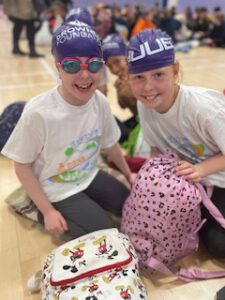





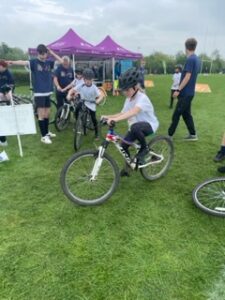






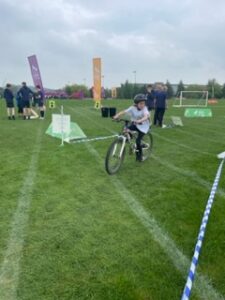

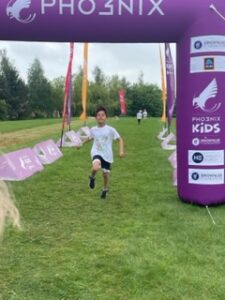





This week’s message (Thursday 12 May 2022)
Posted on 12 May 2022 by Mr Roundtree
This week, we’ve seen the end of Key Stage 2 SATs for our Year 6 children. Because of the need for extra adults and rooms in school, it’s a week that affects everyone. We know our Year 6 pupils approached the tests admirably and are very deserving of their day off tomorrow! It’s a training day – staff in school will be developing their phonics knowledge and skills.
Happy and healthy and hydrated
We teach our children about the importance of drinking water. We actively encourage them to take drinks throughout the day. Please make sure your child brings in their water bottle each day, and then take it home and wash it regularly. Water is provided at lunchtime for all children, whether they’re having a school dinner or a packed lunch. Please note: at school, children are allowed only to drink water – the healthiest choice.
Happy and healthy and active
Did you know May is National Walking Month? The evenings are getting lighter, the weather is getting warmer – it’s the perfect time to get outside and get walking. It’s not too late to take up the challenge: walk for 20 minutes every day. And walking to and from school is the ideal opportunity to achieve this!
Health advice
Are you aware there’s a rise in cases of hepatitis amongst children? No one’s quite sure yet why we’re seeing this rise in hepatitis (liver inflammation).
Be alert to the signs of hepatitis:
- yellowing of the white part of the eyes or skin (jaundice)
- dark urine
- pale, grey-coloured faeces (poo)
- itchy skin
- muscle and joint pain
- a high temperature
- feeling and being sick
- feeling unusually tired all the time
- loss of appetite
- tummy pain
If you’re concerned, contact a health care professional.
Good hygiene, including supervising hand washing in young children, can help to prevent infections that can cause hepatitis.
Children experiencing symptoms of a gastrointestinal infection including vomiting and diarrhoea should stay at home and not return to school until 48 hours after the symptoms have stopped. This is our regular advice to parents.
Leeds is outstanding
Have you heard the news? Ofsted has once again rated children’s services provided by Leeds City Council as ‘outstanding’.
The outstanding rating, previously received in 2018, comes following a rigorous inspection into services for the most vulnerable children and young people – those children in need of help and protection, children in care and care leavers.
We started this week’s message with reference to the training day tomorrow. Whatever you get up to tomorrow, and throughout the weekend, enjoy!
This week’s message (Friday 06 May 2022)
Posted on 06 May 2022 by Mr Roundtree
The Summer Term is a busy one for schools, not least because of all the statutory assessments: we’ve had end of Key Stage 1 assessments this week, and end of Key Stage 2 assessments (the SATs) are coming up next week. Also coming up are Year 1 phonics screening checks and Year 4 multiplication checks. Dates for these are in the school calendar.
Help support your child by making sure they’re reading daily (and practising times tables from Year 2), making sure they’re getting enough sleep, and making sure they’re enjoying time outdoors for play, too.
This week, we’ve a mix of messages…
Social networking
It’s estimated that about a third of children aged 8-11 have profiles on TikTok. But do you know the minimum age to use TikTok? Or other social networking sites? Most require users to be at least 13 years of age.
We’ve warned you before about the risks involved in primary school age children accessing TikTok. We’re sadly still encountering problems that stem from it. Please do check out advice so your child is protected.
High temperature
It’s been a while since we had to speak about Covid. Thankfully, the number of cases is dropping – but we do still have cases of Covid around. To help, if your child has a temperature, they should stay at home. (Please don’t send them to school with a dose of Calpol – that might help the symptoms, but your child can still spread Covid.)
Reception to Year 1 transition
This message comes from Mrs Beesley, our Early Years Leader:
As the weather becomes brighter and we near the end of the academic year, you may be thinking about your child’s next steps as they journey into Year 1. Moving to Year 1 is perhaps a less significant change for children – that’s because we’re a happy and healthy place to learn where we all know each other.
A meeting for parents on Thursday 23 June starts our transition process. Here, you’ll meet the Key Stage 1 staff (where possible) and find out about the Year 1 curriculum. You’ll get to see where your child will be learning. The next step is for your child to spend some time in the Year 1 classrooms. They’ll meet the teacher and join in with the learning, getting a taste of what it’s like to be in Year 1. A whole-school transition session, on Thursday 14 July, completes the process. Children will spend an afternoon with their new teacher, making plans for the learning in the year ahead.
This is a really exciting time of year, moving on and taking those next steps whilst continuing to strengthen the effective learning behaviours they’ve established in Reception.
Our settling in survey
Talking of Reception, thank you to parents of Reception who responded to our recent survey about various aspects of the first year at school. We’ve reviewed the responses.
Overall, for example, you’ve told us that you’d like to have chances to get into the classroom – we definitely agree! Normally, there would be various opportunities across the year, but sadly the high incidents of Covid meant this didn’t happen. Next year (we know – too late for you, sadly), we’re planning a mix of visits to Reception plus some Zoom sessions – it seems most of you found these convenient.
Across Sphere Federation, there were just one or two small issues, all of which we hope we’ve addressed. Please do speak with Mrs Weekes if you’ve any questions, comments or concerns – we can’t guarantee we’ll be able to act on everything, but we do guarantee we’ll listen and consider.
Other surveys
Sticking with surveys…
On a national level, the Children’s Commissioner, Dame Rachel de Souza writes:
Family is a core pillar of my work as Children’s Commissioner, following ‘The Big Ask’ survey, which demonstrated how important families are to children.
Children explained how having a supportive family has a positive impact on their lives, from receiving emotional support, to being able to talk with family members about their worries and aspirations for the future. I have been commissioned by government to undertake a review of family life across the country.
The family review will seek to understand the composition of the modern family. It will explore whether the needs of children are understood in the provision of services to families, and how we can improve children’s outcomes by developing the way public services understand the needs of families as a unit.
Capturing children’s voices is key to this review. That is why I am launching my call for action… Please encourage children to complete the questions on the Children’s Commissioner website, and to share their view on family life. The answers will help us understand what children think of family life and help inform our work.
Look out for our annual survey for all parents and carers later this term, too.
Have a happy and healthy weekend!
Summer term after-school clubs
Posted on 05 May 2022 by Mrs Taylor
Edit: places can still be booked for after-school clubs.
We have spaces available on:
Tuesday – basketball Y4-6 now open to Y3
Tuesday – rugby Y1-3 now open to reception
Thursday – multi-games Y4-6 now open to Y3
After-school clubs will be restarting next week and they will run for eight weeks until week commencing 4th July. Places can be booked via Gateway.
Our physical activity clubs continue to be heavily subsidised through the investment of our PE and Sport Premium.
Each club has a limit on the maximum number of children who can attend. As numbers are limited we ask that you limit your child to one club initially. If there are clubs with remaining places, we will then offer these as a second club.
Please contact the office if you have any queries about the clubs or the booking system.

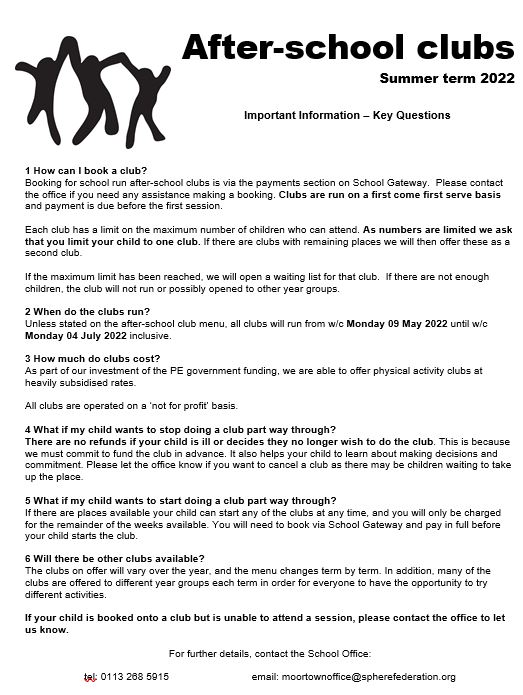
Living and learning: mindfulness
Posted on 04 May 2022 by Mrs Taylor
As a happy and healthy school, we encourage pupils to look after their mental health as well as their physical health. Read our mindfulness newsletter for ideas and techniques to try to support this.
As part of Mental Health Awareness Week, Chirpy, in Chapel Allerton, are hosting FREE after school Mindfulness Moments For Minis workshops. A time for children to reconnect and calm their minds.
Wednesday 11th May 4:30pm – 5:15pm Age 5-10
Thursday 12th May 4:30pm – 5:15pm Age 5-10
Friday 13th May 10am -10:30am pre school
Bookings can be made here.
By teaching mindfulness to children they learn the skills they need to build self-awareness, confidence and cope with stress. Mindfulness can help children deal with tough emotions and help them learn ways to relax and calm the mind and the body.
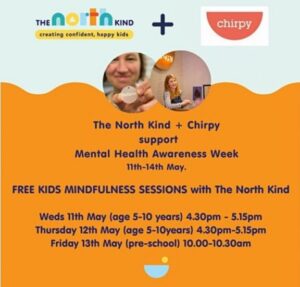
This week’s message (Friday 29 April 2022)
Posted on 29 April 2022 by Mr Roundtree
This half-term, your child is a geographer. This week’s message, from Mr Wilks, our Sphere Federation Topic Leader, helps you to support your child at home…
However, before we dive right in, here’s a reminder about topics and what they look like.
What do we mean by topics?
Topics are the vehicle for delivering much of the learning in the foundation subjects (eg History, Art, Geography, DT). Each half-termly topic has a driving subject – the main focus for teaching pupils the knowledge and skills they need to succeed in life. The driver changes with each topic to ensure a broad and balanced curriculum.
Although the learning in each topic is provided by the driving subject, there are opportunities for enrichment through other subjects. For example, learning in a history driven subject may be enriched by observational drawing of an artefact. In this example, the enricher is art.
For more information about the intent, implementation and impact of our topics, click here.
What is this half-term’s topic?
This half-term, we’re geographers. The topic is called Explorers.
We’re comparing a place in the United Kingdom with a place in another country. Y1,2 children are heading to Kenya in Africa; Y3,4 children are having a mini-break in Venice; and Y5,6 children are trekking through the Amazon Rainforest in South America.
Across the year groups, children are developing their understanding of some key geographical concepts:
- Space is a precise location, eg a country, city a latitude or longitude.
- Place = location + meaning. This includes the physical and human geography that make a place unique. Importantly, place is not rigid. It is changing and can be perceived in different ways.
- Scale is defined by the relative sizes of places. This could be differences in area, population, distances. Scale can also be defined by our view of the world. For example, we may consider an aspect of geography on a local, national and international scale.
- Interdependence is the idea that the world is connected and that countries or individuals do not act in isolation. Our actions here affect people in different countries around the world. For example, food, energy, holidays, climate.
Click this link to the Curriculum Statement for more information about key concepts (page 19) and age-related expectations and vocabulary (page 22 and 23).
Years 1 and 2
Children begin the topic by learning about the different continents and oceans in the world. They learn about the Equator and how it splits the Earth into two hemispheres. They then focus on a specific continent, Africa, and a specific country within that continent, Kenya. They compare Nairobi in Kenya to London, with a focus on the physical and human geography of these two places. Finally, they take a visit into the countryside and compare features of the Yorkshire Dales with a National Park just outside Nairobi.
Years 3 and 4
Children recap learning about the Equator and hemispheres. They then develop that by learning about the tropics and climate zones. A focus on European and world cities and countries follows; this links to climate zone learning. After that, they focus in on Venice in Italy and its physical and human geography which they compare with York. They’ll learn about the positives and benefits that tourism brings, putting themselves in the shoes of both tourists visiting the places and locals who live there. Finally, they’ll learn about the problems posed by flooding in both localities and the solutions they have introduced to limit the consequences of flooding.
Years 5 and 6
We begin the topic by learning about the different types of biomes found on Earth and how these are linked to climate. Children then focus on the biomes found in Brazil and the UK. They then focus on Brazil more generally, building their understanding of it as a place. Next, they learn about the Amazon Rainforest and its importance to Brazil in terms of the economy as well as its importance ecologically. They’ll learn about the threats to the rainforest and the impact that deforestation is having. Finally, children consider what Brazil – and we – need to do to slow down deforestation and what we can do to slow deforestation.
How can you help?
Regardless of the year group your child is in, Google Earth is a brilliant tool to help develop children’s understanding of space, place, scale and interdependence. Zoom right in on your home and then zoom out to reveal the area of Leeds that you live in. Zoom further out to see what city you live. Zoom further for the county. A little further and you might start to spot some national parks. Further still and you can see the country that we live in. Keep zooming and you’ll see the continent we live in (though this isn’t labelled). Before you know it, you’re floating in space and circling the Earth!
Google Maps is another great tool for comparing places. Try the street view option and you can walk along a street in Nairobi and a street in London. Take a drive through the lush Yorkshire Dales and compare this to the Kenyan countryside. You could wander down the Shambles in York and compare this to the streets in Venice. You can also compare images of the same street from different points in time.
Quizzing your children about some locational knowledge will help them to remember important information. I’ve listed some examples below. Use the age-related expectations (see the links to our Curriculum Statement, above) to find the right pitch for your child.
- Which continent do we live in?
- Which country do we live in?
- In which hemisphere is our country located?
- Which county do we live in?
- Which city do we live in?
- Which part of Leeds do we live in?
- Which four countries make up the United Kingdom?
If you can, go to the library and get some geography-related books, especially an atlas. You could compare maps of the same place to see what type of information they show. For example, you find lots of maps of the United Kingdom. One might show the countries and capital cities. Another might show the mountains, rivers and national parks. Another might give information about the climate.
For older children, there are lots of different games and activities on the Ordnance Survey Mapzone website. I especially like the jigsaws in the Map Puzzles section of the Games!
Also for children in Key Stage 2, there are lots of information and some tasks and quizzes on the BBC Bitesize website.